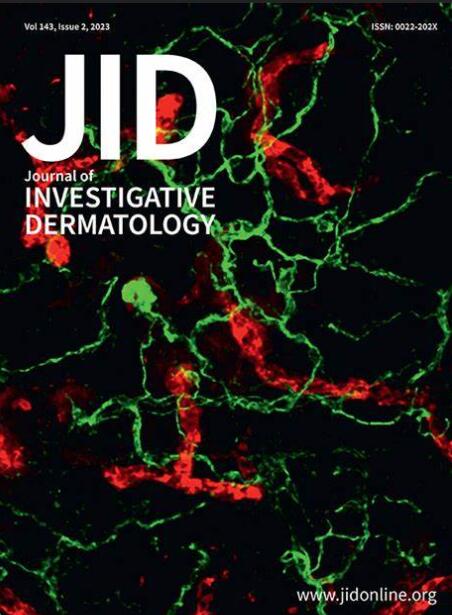FGF21通过抑制CK2α/GLI2信号轴改善成纤维细胞活化和系统性硬化症
IF 5.7
2区 医学
Q1 DERMATOLOGY
引用次数: 0
摘要
系统性硬化症(SSc)是一种病因不明的典型纤维化疾病,其特点是成纤维细胞异常活化和细胞外基质过度沉积。遗憾的是,目前尚缺乏有效的治疗方法。成纤维细胞生长因子 21(FGF21)在介导多种生物活性方面发挥着关键作用。然而,它在 SSc 中的具体功能尚不清楚。在这项研究中,我们发现在纤维化皮肤组织和转化生长因子-β(TGF-β)刺激的成纤维细胞中,FGF21 的表达明显下调。此外,我们的研究表明,在皮肤中使用重组 FGF21 能明显缓解博莱霉素(BLM)诱导的和 TGF-β 受体 I(TBRI)激活的纤维化,并抑制成纤维细胞的活化,而 FGF21 的缺失会加剧皮肤纤维化。从机制上讲,FGF21 可抑制 CK2α 的活性并促进 GLI2 的降解。总之,这些结果表明,FGF21可通过CK2α/GLI2信号通路减轻皮肤纤维化,因此可能成为系统性硬化症的潜在治疗靶点。本文章由计算机程序翻译,如有差异,请以英文原文为准。

FGF21 Ameliorates Fibroblasts Activation and Systemic Sclerosis by Inhibiting CK2α/GLI2 Signaling Axis
Systemic sclerosis is a typical fibrotic disease of unknown etiology that is characterized by abnormal fibroblast activation and excessive deposition of extracellular matrix. Unfortunately, effective therapeutic approaches are lacking. FGF21 plays a key role in mediating a variety of biological activities. However, its specific function in systemic sclerosis is unclear. In this study, we found that the expression of FGF21 was significantly downregulated in fibrotic skin tissue and in TGF-β–stimulated fibroblasts. Furthermore, our studies demonstrated that treatment with recombinant FGF21 in the skin significantly alleviated bleomycin-induced and TBRI-activated fibrosis and inhibited the activation of fibroblasts, whereas skin fibrosis was exacerbated by deletion of FGF21. Mechanistically, FGF21 inhibits the activity of CK2α and promotes the degradation of GLI2. In conclusion, these results indicate that FGF21 attenuates skin fibrosis through the CK2α/GLI2 signaling pathway and therefore may be a potential therapeutic target for systemic sclerosis.
求助全文
通过发布文献求助,成功后即可免费获取论文全文。
去求助
来源期刊
CiteScore
8.70
自引率
4.60%
发文量
1610
审稿时长
2 months
期刊介绍:
Journal of Investigative Dermatology (JID) publishes reports describing original research on all aspects of cutaneous biology and skin disease. Topics include biochemistry, biophysics, carcinogenesis, cell regulation, clinical research, development, embryology, epidemiology and other population-based research, extracellular matrix, genetics, immunology, melanocyte biology, microbiology, molecular and cell biology, pathology, percutaneous absorption, pharmacology, photobiology, physiology, skin structure, and wound healing

 求助内容:
求助内容: 应助结果提醒方式:
应助结果提醒方式:


